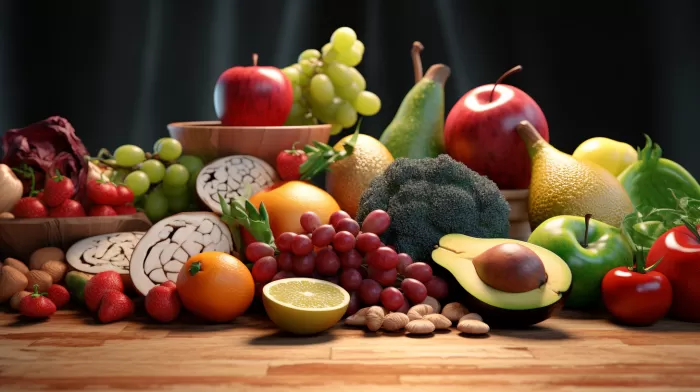As you grow older, specifically after the age of 40, it becomes even more crucial to pay close attention to what you eat. Your testosterone levels begin to decline, and you may start experiencing difficulties in seeing results from your workouts. Not to mention, you may also become more prone to fatigue, forgetfulness, and joint problems.
Several foods can help you maintain good health as you age, including those that support heart health, prostate health, strong bones, mental health, and a healthy sex life. Eating well can also decrease your chances of developing various diseases.
Food for Heart Health
Good circulation is essential for overall health and sexual health, particularly in avoiding erectile dysfunction. Make sure your diet includes heart-healthy fats like avocados, nuts, and plant-based oils (especially olive oil) that contain monounsaturated fats. Foods rich in folate, such as spinach, asparagus, Brussels sprouts, broccoli, beets, kale, Swiss chard, bok choy, and cabbage, help support good cardiovascular health and protect the lining of your arteries.
Foods for Prostate Health
Eating fresh fruits and vegetables can help prevent an enlarged prostate, a common problem for aging men that can lead to urinary and ejaculatory problems and erectile dysfunction (ED). Vegetables rich in nitrates (beets), lycopene (tomatoes), and folate (green leafy vegetables, asparagus, and bananas) are particularly helpful for maintaining prostate health and preventing prostate cancer.
Cooked tomatoes are very high in lycopene, an antioxidant important for good prostate health and prostate cancer prevention; however, be cautious of canned tomatoes due to bisphenol-A (BPA) from can linings. Look for tomatoes in glass or BPA-free packaging. Watermelon is another excellent source of lycopene.
Omega-3 fatty acids, found in fatty fish (such as salmon, sardines, and tuna), chia seeds, and flaxseed oil, are beneficial for prostate health and cancer prevention. Studies have demonstrated that consuming fish oil high in omega-3 may decrease inflammation in the prostate and help prevent cancer from progressing.
Pomegranates are another food recommended for prostate health due to their high antioxidant content and anti-inflammatory properties. They are also helpful towards preventing prostate cancer and providing relief to those with common prostate conditions like an enlarged prostate and prostatitis.
Cruciferous vegetables, such as broccoli, cauliflower, and cabbage, contain the phytonutrient 3,3-Diindolylmethane (DIM) which supports hormone balance and normal prostate size. You can also find these phytonutrients in prostate supplements like Prost-P10x.
Foods for Strong Bones
Prevent bone loss as you age with weight-bearing exercises and a diet incorporating foods naturally high in calcium, such as spinach, broccoli, kale, bok choy, arugula, tofu, almonds, almond butter, sesame seeds, chia seeds, and figs. Avoid calcium supplements and dairy as they are associated with a higher risk of prostate cancer and heart attack. Obtaining calcium from whole foods is more beneficial as it provides additional minerals and micronutrients that support bone health.
Foods for Better Sexual Health
To counteract the decrease in erectile strength and libido that comes with age, look to foods high in nitrates and lycopene like beets. When consuming vegetables with high nitrate content such as beets, radishes, carrots, lettuce, celery, and turnip tops, the nitrates get converted to nitrites by the bacteria in your mouth and then to nitric oxide in your stomach. This process helps with erectile dysfunction, following the same concept as treatments like Viagra.
Lycopene, found in tomatoes and watermelon, also helps improve erectile function when combined with spinach and oily items like avocado or olive oil. In a study at the Madrid Urological Institute, 50% of men with ED who consumed tomato lycopene and extra virgin olive oil experienced improved erections.
Foods that Support Mental Health
Foods rich in omega-3 fatty acids (found in fatty fish like salmon, mackerel, sardines, or herring as well as walnuts, flaxseed, and olive oil) and certain vitamins like vitamin C (found in red peppers, broccoli, and strawberries) and vitamin E (found in olive oil and almonds) are important for brain health and can help lower the risk for Alzheimer’s disease, dementia, and depression.
Berries are particularly beneficial for brain health as they contain antioxidants called polyphenols that reduce inflammation and help brain cells function better. Studies have shown that individuals in their 60s who consume more spinach and other leafy green vegetables maintain better memory, verbal skills, and overall cognitive abilities than those who don’t consume them regularly.
Dark chocolate with a 70% cocoa content offers flavonoids that help fight heart disease and slow down the effects of dementia. An Italian study found that people with mild dementia who consumed cocoa with high amounts of flavonoids performed better on mental tests than those who consumed cocoa with lower amounts of flavonoids.
Foods to Prevent Cancer
Several foods and drinks have been found to help prevent cancer, especially prostate cancer. Both red wine and green tea contain antioxidants and phytonutrients like resveratrol and catechins, respectively, which help prevent cancer. Additionally, consuming at least five servings per week of raw cruciferous vegetables can help prevent various types of cancer. These vegetables, such as broccoli, cabbage, cauliflower, and kale, contain high levels of glucosinolates that become iosthiocyanates when digested, inhibiting tumor growth.
Focusing on a balanced diet that includes these foods can help you maintain hormonal balance, mental health, and overall wellness as you age. Many of the foods mentioned here serve multiple purposes, offering benefits to various aspects of your health. A whole-body approach involving diet, exercise, and supplements can significantly impact how you feel and prevent diseases as you get older.



